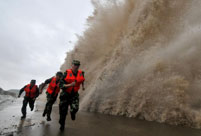WASHINGTON, Oct. 7 -- The U.S. government said Monday its position that Syrian President Bashar al-Assad must step down has not changed despite Secretary of State John Kerry's positive remarks on Syria's cooperation on destroying its chemical weapons.
"Our position on him is the same, that he's lost all legitimacy to lead Syria, that we're working toward a Geneva II conference that gets us to a place where both sides, by mutual consent, pick the transitional leadership of Syria," State Department deputy spokeswoman Marie Harf told a regular news briefing.
She was responding a query about Kerry's remarks in Indonesia that he was "appreciative for" the Russian cooperation and obviously for the Syrian compliance with the UN resolution by starting to destroy Syria's chemical weapons.
"I think it's a credit to the Assad regime, frankly. It's a good beginning and we welcome a good beginning," Kerry, who is attending the Asia-Pacific Economic Cooperation summit in Bali, told reporters after meeting with his Russian counterpart Sergei Lavrov.
Harf said that it was clear the Syrian opposition will not allow Assad to continue its rule. She added that U.S. Ambassador to Syria Robert Ford held a "very productive" meeting over the weekend with the Syrian opposition in Istanbul, Turkey, including rebel commander Salim Idris.
Harf brushed off any suggestion that Kerry's remarks showed any U.S. change to its position on the future of Assad, though she called the Assad government's move as "a step forward," saying that "our position on the fact that he must go has not changed, and this in no way is an indication that he can remain in power."
She said the Assad regime or an eventual transitional government in Syria will have the responsibility for allowing access and assisting in the destruction of the chemical weapons.
Syria agreed in September to accept a Russian-brokered deal with the U.S. on placing its chemical weapons under international control before they will be destroyed, averting a military strike by the U.S. to punish it for perpetrating an alleged chemical attack outside Damascus on Aug. 21, that killed over 14,000 people.
During the Geneva I conference on Syria held in June 2012, an action group comprising of some world powers agreed that a transitional government should be set up in Syria to end the civil war there, but without stipulating the ouster of President Assad.
The Geneva II conference on Syria was originally scheduled to be held in May 2013 with the goal of ending the Syrian conflict and organizing a transition period and post-war reconstruction. But it has been delayed in late June as the U.S. and Russia struggled to finalize preparation for both Syrian government and the opposition's participating in the conference.
The Aug. 21 chemical attack and ensuing standoff between the U.S. and Syria over the latter's chemical weapons further postponed the meeting.
 2013 Colour Me Rad 5K run held in Canada
2013 Colour Me Rad 5K run held in Canada China's destroyer Qingdao sails out of Sydney Harbor
China's destroyer Qingdao sails out of Sydney Harbor Chinese tycoon aims to restore London's Crystal Palace
Chinese tycoon aims to restore London's Crystal Palace A staple of southern Chinese people
A staple of southern Chinese people Typhoon Fitow approaches China
Typhoon Fitow approaches China Tourists take pictures beside Qinghai Lake in Xining
Tourists take pictures beside Qinghai Lake in Xining New couples take wedding photos during holiday
New couples take wedding photos during holiday Serena Williams stumbles through to quarterfinals
Serena Williams stumbles through to quarterfinals Thailand Mobile Expo 2013 kicks off
Thailand Mobile Expo 2013 kicks off Photo collection of Chinese Navy
Photo collection of Chinese Navy Dense haze envelops N China
Dense haze envelops N China Twins Culture Festival kicks off in Beijing
Twins Culture Festival kicks off in Beijing UNESCO world heritage site: Montale Tower
UNESCO world heritage site: Montale Tower Egyptian protesters clash with police amid war anniv. celebration
Egyptian protesters clash with police amid war anniv. celebration Serena Williams wins second China Open title
Serena Williams wins second China Open titleDay|Week|Month